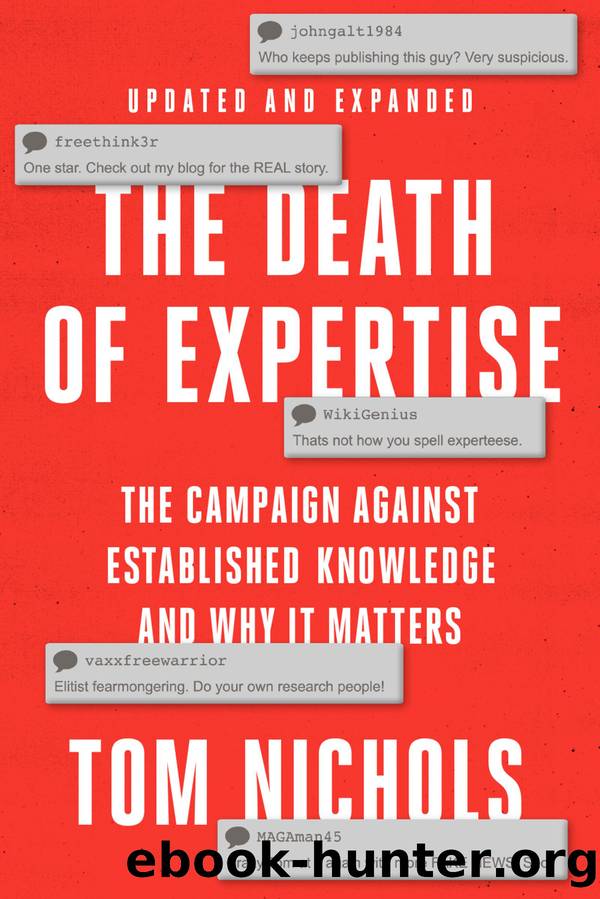The Death of Expertise by Tom Nichols;

Author:Tom Nichols;
Language: eng
Format: epub
Publisher: Oxford University Press USA
Published: 2024-05-15T00:00:00+00:00
Radio Killed the Video Star
While many professionals and experts tend to blame the Internet for the profusion of would-be know-it-alls lecturing them in their offices, others invoke the twenty-four-hour news cycle as another culprit, drowning people in stories and facts faster than they can absorb them. As with the accusations against the Internet, thereâs good reason for those complaints. Americans now watch the news as if theyâre in the situation room of the White House, hanging on every new scrap of information as if they were personally going to make the call on launching a war. (CNN for many years has appealed to this viewer vanity by calling its afternoon broadcast âThe Situation Room.â)
This doesnât explain, however, why Americans erroneously end up thinking theyâre better informed than the experts on the myriad issues flooding across their screens. For this, we must look a little more closely at how the publicâs relationship with the media developed after the 1970s. The decade of Watergate, âstagflation,â and defeat in Vietnam is the benchmark not only because it was on the cusp of the addition of new technologies like cable, but also because those developments coincided with an accelerating collapse of trust in government and other institutions in American life. The growth of new kinds of media and the decline of trust are both intimately related to the death of expertise.
Television in the 1950s was supposed to displace radio for most kinds of programming. AM radio nonetheless dominated music and sports, with a wide audience reach but a tinny, monaural sound. This inferior sound quality couldnât compete with the obvious problem that human beings, equipped with two ears, prefer listening to everything in stereo. FM offered better soundâas the band Steely Dan promised in a hit song called âFM,â there was âno static at allââbut it took until 1978 for FM radio broadcasts to reach more listeners than AM. Television, meanwhile, with its ability to add visual elements to its reports, grabbed the news and other staples of American life once primarily found on radio.
Radio wasnât dead, however. Especially on the AM band, radio offered something television could not: an interactive format. Relatively unhindered by the limits of airtime and cheap to produce, the idea behind talk radio was simple: give the host a microphone, hit the switch, and take calls from people who wanted to talk about the news and express their own views. With other forms of entertainment gravitating to television or to the richer sound of FM, it was an obvious choice for stations looking for affordable programming.
Talk radio had immense political consequences, and it provided the foundations for attacks on established knowledge that flowered later on social media. No one did more to drive the ascendance of talk radio than the broadcaster Rush Limbaugh. From the late 1980s until his death in 2021, Limbaugh created an alternative to the often stodgy world of Sunday-morning television punditry. Limbaugh wasnât the first; despite the belief held by many of his critics that
Download
This site does not store any files on its server. We only index and link to content provided by other sites. Please contact the content providers to delete copyright contents if any and email us, we'll remove relevant links or contents immediately.
The Secret History by Donna Tartt(16699)
The Social Justice Warrior Handbook by Lisa De Pasquale(11501)
Thirteen Reasons Why by Jay Asher(7821)
This Is How You Lose Her by Junot Diaz(5813)
Weapons of Math Destruction by Cathy O'Neil(5066)
Zero to One by Peter Thiel(4854)
The Myth of the Strong Leader by Archie Brown(4803)
Promise Me, Dad by Joe Biden(4466)
Beartown by Fredrik Backman(4455)
How Democracies Die by Steven Levitsky & Daniel Ziblatt(4438)
Stone's Rules by Roger Stone(4431)
The Fire Next Time by James Baldwin(4360)
100 Deadly Skills by Clint Emerson(4101)
A Higher Loyalty: Truth, Lies, and Leadership by James Comey(4049)
Rise and Kill First by Ronen Bergman(4035)
The David Icke Guide to the Global Conspiracy (and how to end it) by David Icke(3903)
The Farm by Tom Rob Smith(3888)
Secrecy World by Jake Bernstein(3798)
The Doomsday Machine by Daniel Ellsberg(3745)
